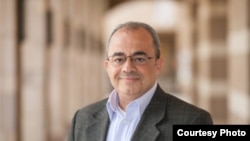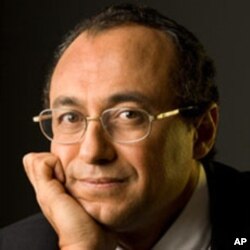WASHINGTON, DC —
As Egyptians mark a somber three-year anniversary of the January 25th revolution that ousted the autocratic Hosni Mubarak, a wide-ranging crackdown by the military-backed government is gathering steam. With nearly all of the leaders of the now-banned Muslim Brotherhood in jail, the dragnet is now increasingly targeting secularists and liberal critics of the interim government.
In recent weeks, prominent secular activists like Ahmed Maher, the founder of the April 6th youth movement, have been sentenced to lengthy prison terms. Others like former parliamentarian Amr Hamzawy have been charged with “insulting the judiciary.”
The latest example: Emad Shahin, a scholar of political Islam who has taught at Harvard, Notre Dame and the American University of Cairo. Just a few days ago, Shahin was charged with espionage – a development that surprised many of his academic colleagues around the world who describe the Egyptian academic as a moderate non-political figure, albeit one who criticized the harsh crackdown on the Muslim Brotherhood.
In a statement to students, family and friends, a copy of which was obtained by VOA, Shahin says he is shocked by the allegations, which he “categorically and emphatically” denies.
“The indictment listed far-fetched charges that my friends and associates would regard not merely as improbably, but as beyond preposterous,” Shahin wrote.
He listed the litany of charges against him, which include espionage, leading an illegal organization, supporting and giving information to a banned organization, calling for the suspension of the constitution, preventing authorities from performing their duties, “harming national unity and social harmony” and working to change the government by force.
Rule by law more than rule of law
Michele Dunne is a senior associate at the Carnegie Endowment for World Peace Middle East program, where she focuses on political and economic change in Arab countries, particularly Egypt. She says while Shahin has never been involved directly in politics, his recent public criticism of human rights abuses in Egypt made him a target of the authorities.
“He was one of the few in Egypt who had the courage to speak up after the July military coup to criticize the human rights abuses that were taking place, and to do so to the international press, and it now seems that this case accusing him of involvement in terrorism has been launched simply to silence and discredit him,” she said.
Dunne says, similar arrests are taking place more and more often. “We have seen this in Egypt before - it’s more rule by law than rule of law, using laws that exist in the judicial apparatus as a way to go after political opponents and silence and discredit them.”
She says the military and the “deep state,” the old security apparatus that existed under President Mubarak, saw now-ousted Muslim Brotherhood leader Mohammed Morsi’s growing unpopularity as “an opportunity to retake control.”
“And as soon as they removed Morsi, there was a very strong campaign in the Egyptian media to demonize the Muslim Brotherhood - to expose all kinds of alleged terrorism plots, plans to open Egypt to foreign terrorist groups, and so forth - to convince Egyptians that this brutal crackdown was necessary,” said Dunne, adding this has happened in the past.
“We have seen this in Egypt before - it’s more rule by law than rule of law, using laws that exist in the judicial apparatus as a way to go after political opponents and silence and discredit them.”
Unfair criticism
But others like Tawfik Hamid, Senior Fellow and Chair for the Study of Islamic Radicalism at the Potomac Institute for Policy Studies, say criticism of the interim government is unfair given the situation Egypt finds itself in.
“What’s happening is that Egypt is fighting for its very existence. People are very nervous and emotional because they are afraid of becoming another Iraq or another Afghanistan with the Taliban,” Hamid said. “You had clear-cut democratic elections there, but look at them now. And Egyptians certainly don’t want to end up like Syria.”
That is why, says Hamid, the bulk of the population now backs the regime.
“At this stage, the military is seen by many as is the only organized body in the country that can carry the country at this stage,” he said.
Unresolved issues cloud future
Dunne points out that throughout the tumult of the past three years, Egypt still finds itself suffering from a bad economy, which, after all is said and done, is what the original protests were fighting.
“That hasn’t improved, and there is no prospect immediately of the military-backed government improving the economy,” Dunne said. That being the case — and in spite of tough measures against dissenters - she predicts Egypt’s revolution is far from over.
In recent weeks, prominent secular activists like Ahmed Maher, the founder of the April 6th youth movement, have been sentenced to lengthy prison terms. Others like former parliamentarian Amr Hamzawy have been charged with “insulting the judiciary.”
The latest example: Emad Shahin, a scholar of political Islam who has taught at Harvard, Notre Dame and the American University of Cairo. Just a few days ago, Shahin was charged with espionage – a development that surprised many of his academic colleagues around the world who describe the Egyptian academic as a moderate non-political figure, albeit one who criticized the harsh crackdown on the Muslim Brotherhood.
In a statement to students, family and friends, a copy of which was obtained by VOA, Shahin says he is shocked by the allegations, which he “categorically and emphatically” denies.
“The indictment listed far-fetched charges that my friends and associates would regard not merely as improbably, but as beyond preposterous,” Shahin wrote.
He listed the litany of charges against him, which include espionage, leading an illegal organization, supporting and giving information to a banned organization, calling for the suspension of the constitution, preventing authorities from performing their duties, “harming national unity and social harmony” and working to change the government by force.
Rule by law more than rule of law
Michele Dunne is a senior associate at the Carnegie Endowment for World Peace Middle East program, where she focuses on political and economic change in Arab countries, particularly Egypt. She says while Shahin has never been involved directly in politics, his recent public criticism of human rights abuses in Egypt made him a target of the authorities.
“He was one of the few in Egypt who had the courage to speak up after the July military coup to criticize the human rights abuses that were taking place, and to do so to the international press, and it now seems that this case accusing him of involvement in terrorism has been launched simply to silence and discredit him,” she said.
Dunne says, similar arrests are taking place more and more often. “We have seen this in Egypt before - it’s more rule by law than rule of law, using laws that exist in the judicial apparatus as a way to go after political opponents and silence and discredit them.”
She says the military and the “deep state,” the old security apparatus that existed under President Mubarak, saw now-ousted Muslim Brotherhood leader Mohammed Morsi’s growing unpopularity as “an opportunity to retake control.”
“And as soon as they removed Morsi, there was a very strong campaign in the Egyptian media to demonize the Muslim Brotherhood - to expose all kinds of alleged terrorism plots, plans to open Egypt to foreign terrorist groups, and so forth - to convince Egyptians that this brutal crackdown was necessary,” said Dunne, adding this has happened in the past.
“We have seen this in Egypt before - it’s more rule by law than rule of law, using laws that exist in the judicial apparatus as a way to go after political opponents and silence and discredit them.”
Unfair criticism
But others like Tawfik Hamid, Senior Fellow and Chair for the Study of Islamic Radicalism at the Potomac Institute for Policy Studies, say criticism of the interim government is unfair given the situation Egypt finds itself in.
“What’s happening is that Egypt is fighting for its very existence. People are very nervous and emotional because they are afraid of becoming another Iraq or another Afghanistan with the Taliban,” Hamid said. “You had clear-cut democratic elections there, but look at them now. And Egyptians certainly don’t want to end up like Syria.”
That is why, says Hamid, the bulk of the population now backs the regime.
“At this stage, the military is seen by many as is the only organized body in the country that can carry the country at this stage,” he said.
Unresolved issues cloud future
Dunne points out that throughout the tumult of the past three years, Egypt still finds itself suffering from a bad economy, which, after all is said and done, is what the original protests were fighting.
“That hasn’t improved, and there is no prospect immediately of the military-backed government improving the economy,” Dunne said. That being the case — and in spite of tough measures against dissenters - she predicts Egypt’s revolution is far from over.






